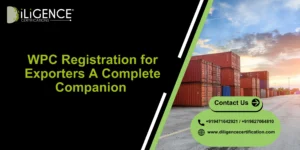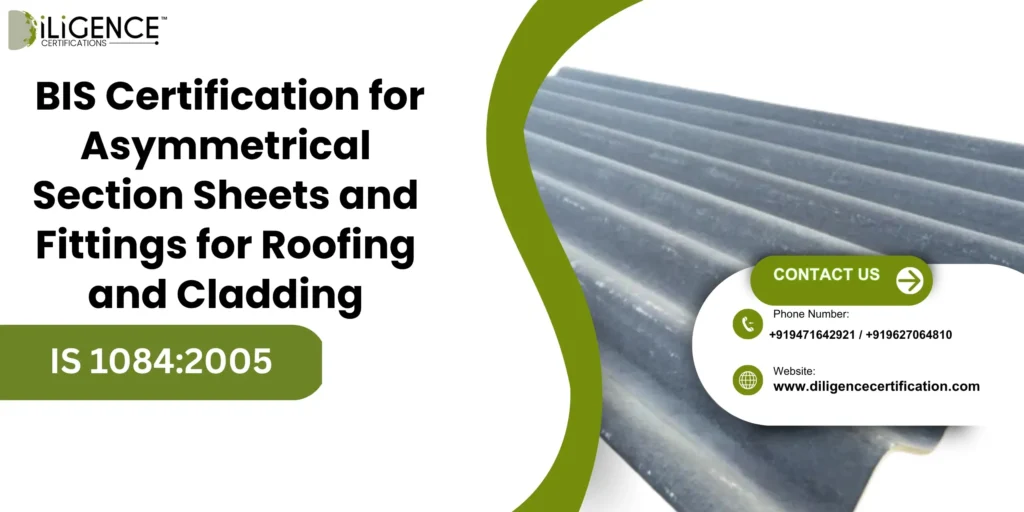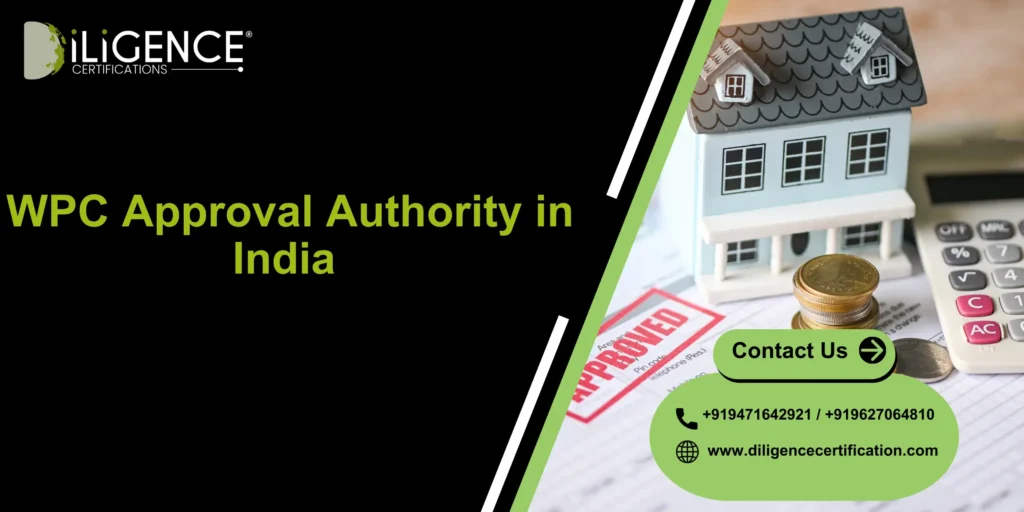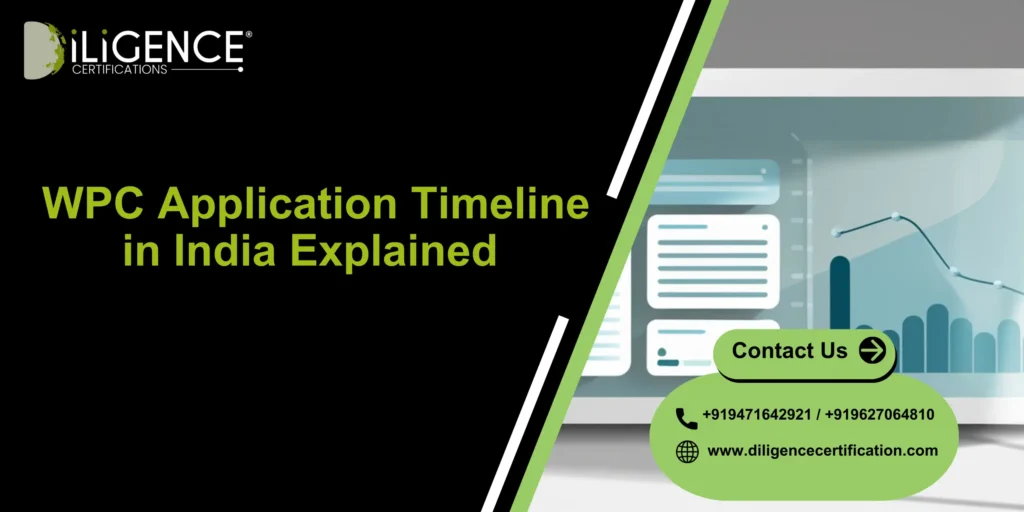- BIS Certification Asymmetrical Sheets ensures compliance with IS 14871:2000 for Fibre Reinforced Cement Products.
- The ISI mark confirms product strength, weather durability, and safety for roofing and cladding applications.
- Diligence Certification provides complete consulting support for testing, documentation, and BIS license approval.
Introduction
In early 2024, a building materials manufacturer in Pune faced a setback while bidding for a smart city roofing project. Their Fibre Reinforced Cement (FRC) asymmetrical section sheets were technically sound, but the tender committee rejected their offer — simply because the sheets lacked BIS Certification under IS 14871:2000.
Under the Bureau of Indian Standards (BIS) Act, 2016, roofing and cladding materials supplied for infrastructure and housing projects must bear the ISI Mark to ensure safety, durability, and compliance with Indian standards.
This case reflects a common challenge in India’s roofing industry — manufacturers meeting internal quality checks but missing the mandatory BIS license, which ultimately restricts market access.
At Diligence Certification, we guide manufacturers through the entire certification journey — from lab testing to final BIS license approval — ensuring full compliance with IS 14871:2000( bis certification asymmetrical sheets ) and zero rejection during audits.
Understanding IS 14871:2000 — The Standard Behind the Certification
IS 14871:2000( bis certification asymmetrical sheets ) lays down the specifications for Fibre Reinforced Cement Products – Long Corrugated or bis certification asymmetrical sheets.
These products are used extensively in industrial sheds, agricultural buildings, housing colonies, and institutional roofing, where durability and weather resistance are vital.
Key Technical Parameters Covered Under IS 14871:2000:
- Composition:
Sheets are made of cement reinforced with organic or inorganic fibres, providing enhanced tensile strength and flexibility. - Dimensional Accuracy:
The standard defines strict tolerances for thickness, width, and corrugation geometry for precise fitting during construction. - Mechanical Strength:
Minimum breaking load, bending strength, and impact resistance must meet the required BIS benchmarks. - Water Absorption:
Sheets are tested for moisture absorption to prevent degradation during monsoon or humid conditions. - Fire Resistance:
FRC sheets must withstand standard fire exposure without losing structural integrity. - Weather Durability:
Accelerated weathering tests are conducted to simulate years of outdoor exposure. - Marking Requirements:
Each BIS-certified product must display the ISI Mark, manufacturer’s name, batch number, and license number (CM/L).
Why BIS Certification for Roofing and Cladding Sheets is Crucial
1. Legal Requirement under BIS Act, 2016
Manufacturers cannot legally manufacture or sell asymmetrical section roofing sheets in India without a BIS license for IS 14871:2000.
Violations can lead to product seizure, penalties, or even factory closure.
2. Assurance of Quality and Performance
BIS testing ensures that roofing materials perform well under load-bearing, temperature, and environmental stress, meeting national safety benchmarks.
3. Acceptance in Public and Private Tenders
Government housing schemes like PMAY (Pradhan Mantri Awas Yojana) and Smart City projects strictly mandate ISI-marked roofing and cladding sheets.
4. Competitive Market Advantage
ISI-certified products build customer confidence, strengthen brand reputation, and open access to large infrastructure projects.
5. Export Readiness
Many importing countries accept BIS-certified Indian products as proof of compliance with global safety standards — a key advantage for exporters.
The ISI Mark Explained
The ISI mark on asymmetrical roofing and cladding sheets is not just a symbol — it’s a verified assurance that the product conforms to IS 14871:2000(bis certification asymmetrical sheets).
What the ISI Mark Confirms:
- The product has passed BIS-approved lab testing.
- The manufacturing process meets BIS factory audit requirements.
- Ongoing surveillance ensures consistent product quality.
- The factory maintains traceable production and quality control records.
Benefits of BIS Certification for Manufacturers
| Benefit | Description |
| Legal Compliance | Mandatory under BIS Act, 2016 for roofing sheets under IS 14871:2000(bis certification asymmetrical sheets) |
| Enhanced Durability | BIS-certified sheets undergo stringent physical, mechanical, and fire tests |
| Market Recognition | ISI mark improves acceptance among architects and builders |
| Tender Eligibility | Required for government and institutional projects |
| Customer Confidence | Buyers prefer certified materials for safety assurance |
| Export Leverage | Recognized proof of quality for international markets |
Eligibility Criteria for BIS Certification
To obtain the license, a manufacturer must:
- Be a registered business entity (Company, LLP, or Proprietorship).
- Operate a functional plant for Fibre Reinforced Cement sheets.
- Have in-house quality testing facilities.
- Employ technically qualified personnel.
- Permit BIS inspectors for audit and sample collection.
Step-by-Step Process of BIS Certification for Asymmetrical Roofing Sheets
1. Identify Applicable Standard
Confirm that your product falls under IS 14871:2000( bis certification asymmetrical sheets ) – Fibre Reinforced Cement Products.
2. Application Submission
Submit an online application on the Manak Online BIS Portal with factory and product details.
3. Product Testing
Send samples to a BIS-recognized laboratory for testing on strength, dimensional accuracy, and weather resistance.
4. Factory Inspection
BIS officers visit the facility to verify production process, machinery, and quality control system.
5. Review and Grant of License
After successful lab results and inspection clearance, BIS grants the ISI license, authorizing use of the ISI mark.
6. License Validity and Renewal
The license is valid for 2 years, renewable for up to 5 years based on consistent compliance.
Documents Required for BIS Certification
| Category | Documents |
| Company Information | Incorporation Certificate, GST, Udyam Registration |
| Factory Details | Layout Plan, Machinery List, Process Flow Diagram |
| Quality Records | Internal QC Reports, Calibration Certificates |
| Product Data | Raw Material Composition, Test Results, Fire Resistance Proof |
| BIS Lab Report | Results from BIS-recognized testing laboratory |
Common Challenges During BIS Certification
- Test Rejection:
Failing water absorption or bending strength tests due to improper curing or fibre ratio. - Incomplete Documentation:
Missing quality control logs or calibration certificates often delay approval. - Factory Readiness Issues:
Lack of standard curing chambers or mixing consistency can cause inspection failures. - Testing Delays:
BIS-approved labs may have long queues, affecting project timelines. - Consultant Mistakes:
Using inexperienced agents can result in incomplete test submissions or wrong application categories.
At Diligence Certification, we pre-audit every client’s facility to fix non-conformities before BIS inspection — reducing rejection chances to near zero.
Cost Structure for BIS Certification
| Component | Details |
| Application Fee | BIS online submission charge |
| Testing Fee | Lab charges for IS 14871:2000( bis certification asymmetrical sheets) testing |
| Inspection Fee | BIS officials’ visit and travel costs |
| License Fee | ISI mark authorization and registration charges |
| Renewal Fee | Payable every 2–5 years for renewal |
How Diligence Certification Helps Manufacturers
Diligence Certification is one of India’s trusted BIS Certification Consultants, with deep experience in the roofing and construction material segment.
Our Key Strengths:
- End-to-End Support: From application to renewal.
- Expert Audit Preparation: Pre-assessment to avoid non-compliance.
- Fast Coordination: Accelerated communication with BIS labs and departments.
- Documentation Accuracy: 100% compliant files as per BIS checklist.
- Pan-India Coverage: Clients across Maharashtra, Tamil Nadu, and Gujarat.
Conclusion
Obtaining bis certification asymmetrical sheets (IS 14871:2000) is no longer optional — it’s a legal, safety, and market necessity.
The ISI Mark represents structural safety, long-term durability, and compliance with India’s national standards.
With expert guidance from Diligence Certification, manufacturers can achieve BIS approval smoothly, expand their tender eligibility, and strengthen their brand trust in India’s growing construction market.
Contact Diligence Certification today to begin your BIS registration process for roofing and cladding products and ensure your factory stands compliant, competitive, and audit-ready.
Frequently Asked Questions
What is IS 14871:2000?
It is the Indian Standard for Fibre Reinforced Cement (FRC) asymmetrical section sheets and fittings for roofs and external cladding.
Is BIS Certification necessary for FRC roofing sheets?
BIS Certification under IS 14871:2000 is necessary prior to manufacture or sale in India.
What does the mark of ISI mean on roofing sheets?
It designates that the product has met the BIS requirements for strength, durability and safety.
Who provides the BIS Certification?
BIS Certification is provided by the Bureau of Indian Standards (BIS) which is under the Ministry of Consumer Affairs.
How long does the BIS license last?
BIS license is valid for two years and a license may be renewed for a maximum of five years.
What tests would be performed for certifying?
Tests include bending strength, water absorption, dimensional accuracy, resistance to fire and weather durability.
Can small-scale manufacturers apply for the BIS Certification?
Yes, any registered manufacturer that has a working manufacturing operation and verifiable test capabilities may apply for the BIS certification.
How long does BIS certification take?
The process generally lasts 30–60 days, depending on arrangements for lab testing and inspection of the manufacturing facility.
What occurs if a manufacturer sells roofing sheets without the BIS Certification?
It is a violation of law under the BIS Act, 2016 – subjecting the offender to penalties, confiscation of the product, and/or closures of the operation.
How can Diligence Certification assist in the process?
Diligence Certification helps with testing, documentation, audit preparation, and BIS license approval from start to finish.








 BIS Certification
BIS Certification
 CDSCO
CDSCO
 CPCB
CPCB
 LMPC
LMPC
 WPC Approval
WPC Approval
 Global Approvals
Global Approvals
 TEC
TEC
 ARAI
ARAI
 BEE
BEE
 ISO Certification
ISO Certification
 DGCA Certification
DGCA Certification
 NOC For Steel
NOC For Steel



















 Business Registration
Business Registration















 Legal Services
Legal Services
 Trademark Registration
Trademark Registration
 Copyright Registration
Copyright Registration
 Patent Registration
Patent Registration















































